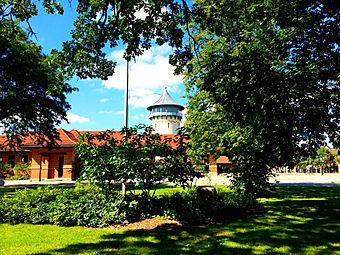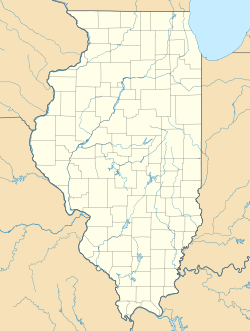Riverside Historic District (Riverside, Illinois) facts for kids
|
Riverside Historic District
|
|

The Riverside Water Tower from Guthrie Park
|
|
| Location | Riverside, Illinois |
|---|---|
| Area | 1,500 acres (610 ha) |
| Built | 1868 |
| Architect | Calvert Vaux; Frederick Law Olmsted; Frank Lloyd Wright |
| NRHP reference No. | 69000055 |
Quick facts for kids Significant dates |
|
| Added to NRHP | September 15, 1969 |
| Designated NHLD | August 29, 1970 |
The Riverside Historic District is also known as the Riverside Landscape Architecture District. It is one of the very first planned neighborhoods in the United States. This special district covers most of the village of Riverside, Illinois. Riverside is a suburb located just west of Chicago. The entire area was carefully planned and designed by famous landscape architects Calvert Vaux and Frederick Law Olmsted. It also features many cool buildings designed by well-known architects.
Contents
Discovering Riverside: America's First Planned Community
In 1869, a company called The Riverside Improvement Company decided to build a special new neighborhood. They wanted to create a charming and modern suburban town called "Riverside." This new town was about nine miles from Chicago. It covered about 1,600 acres of land right along the Des Plaines River.
How Riverside Was Created
Frederick Law Olmsted, who also designed Central Park in New York City, drew up the plans for Riverside. The village of Riverside is very different from other towns near Chicago. All over the village, you'll find winding roads and green areas along the river. This design makes the whole town feel like a big, beautiful park.
The Famous Riverside Water Tower
The Water Tower in Riverside, Illinois, was designed by architects and engineers Jenney, Schermerhor & Bogart. Just like the Water Tower in Chicago, the Riverside water tower is a well-known landmark. It holds water for the town, but it also looks nice and adds to the town's beauty.
Exploring Riverside's Special Buildings
The Riverside district includes all the streets, parkways, parks, and even historic gas streetlights. This area is bordered by 26th Street, Harlem and Ogden Avenues, the Des Plaines River, and Forbes Road. Many homes and estates within the district were designed by famous architects. These include Frank Lloyd Wright, Daniel Burnham, Louis Sullivan, William Le Baron Jenney, Frederick Clarke Withers, and Calvert Vaux.
Some of these homes are so important that they are also special National Historic Landmarks on their own. Examples include the F. F. Tomek House and the Coonley House. Almost the entire village, except for about 100 acres (40 ha), became a National Historic Landmark in 1970.
 | James Van Der Zee |
 | Alma Thomas |
 | Ellis Wilson |
 | Margaret Taylor-Burroughs |



